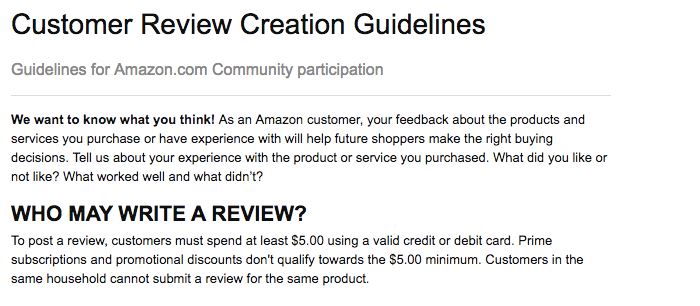Guest blog by Chris McCabe from eCommerceChris
In their latest effort to combat review abuse, Amazon added a clause to their Customer Review Creation Guidelines stating:
“To post a review, customers must spend at least $5.00 using a valid credit or debit card. Prime subscriptions and promotional discounts don’t qualify towards the $5.00 minimum.”
Why did this happen? To stop people from creating fake accounts for the sole purpose of leaving a positive review. If it’s a brand new buyer account, and they have made no purchases, and pay less than $5 for your product, they cannot leave a review.
So what do you do? Well, first let’s talk about the things not to do. That starts with not creating fictitious buyer presence for the sole purpose of inflating reviews, just in case you thought you could do that forever. Are you doing that? Stop doing that. Are you looking for angles around the new policy here below? Start following policies and stop avoiding Amazon’s approach to policy enforcement.

Product review policy amendments center around the legitimacy of the buyer accounts leaving those wonderful, glowing reviews of this or that item that changed the customer’s life. Amazon let this area slide past enforcement teams for a long time, several years of abuse occurring right under their noses, until the Product Review Abuse teams came into being late last year.
Is the party over now? Well, it may not be entirely. Amazon takes a long time to rotate teams around and move the pieces into place when they resolve to change the policy landscape around a particular kind of bad behavior or outright abuse. Yet, we’ve seen that once Amazon DOES move a team or a new Standard Operating Procedure forward, they mean business. It may start with a quick warning for something you did a few months ago, and end with a suspension. Then you’re writing a Plan of Action pleading with them to reconsider. You can admit wrong-doing or claim that their policies were opaque but in the end, policy people will judge if you understand what you did and deserve to come back.
Don’t do any of these things:
- Asking friends and relatives to buy from them and leave glowing reviews, even if the buyer account were related and/or linkable to their seller accounts.
- Create new, fake buyer accounts based on past, and legitimate, buyer account information in order to leave fresh, positive product reviews.
- Offer incentives beyond discounted products to supposedly “independent” reviewers in exchange of automatic positives.
- Purchase items from competitors for the purposes of leaving bad reviews or having employees do the same.
- Having employees purchase using their own buyer accounts for the purposes of leaving a wonderful product review.
- Use of review-producing websites or services which pay reviewers for positive reviews.
- Creating fake email accounts in order to buy from themselves and review their products.
- Using Super URLs to manipulate Amazon’s search algorithm.
There are various activities that they do not want to see sellers doing, but the main question to ask is not “Am l creating fake buyer accounts” or “am I taking real buyer information from past orders and creating NEW buyer accounts based on that (that’s really bad)?” but something a bit more broad: “Do I understand and appreciate the nature and spirit of the Amazon marketplace, or do I look to play angles, find workarounds, and seek out ways to fight competing sellers with whatever weapons I can think of?” It’s a worthwhile question. Would Amazon prefer to have the reviews system manipulated and loopholes exploited, or would they prefer to see sellers observe policies and comply with them? Amazon isn’t really the best marketplace to try to game a system long- term. Short-term benefits stay short.
Amazon has to verify real activity and real people behind these accounts. Of course, in the past, they understood that people would pad reviews by encouraging friends and colleagues and pets and loved ones to post reviews on their items. Sellers realized long ago that perhaps it did not make the most sense in the world to try having their mom help them win popularity contests, and Amazon’s no different. If you try to persuade buyers using any means necessary and pull the wool over Amazon’s eyes in the process, you can expect warnings like this…

..and worse, if you keep it up. So keep it down.
Interested in increasing your positive feedback whilst complying with Amazon’s new guidelines. Sign up for your free 14 day trial of FeedbackExpress today!
About the author

Chris McCabe
If your merchant account is suspended, you’ll waste time and money trying to get back in business. As a former Amazonian, Chris shows sellers how to keep their accounts healthy. Give your account a check-up now.
*A version of this blog originally appeared on the RepricerExpress website


